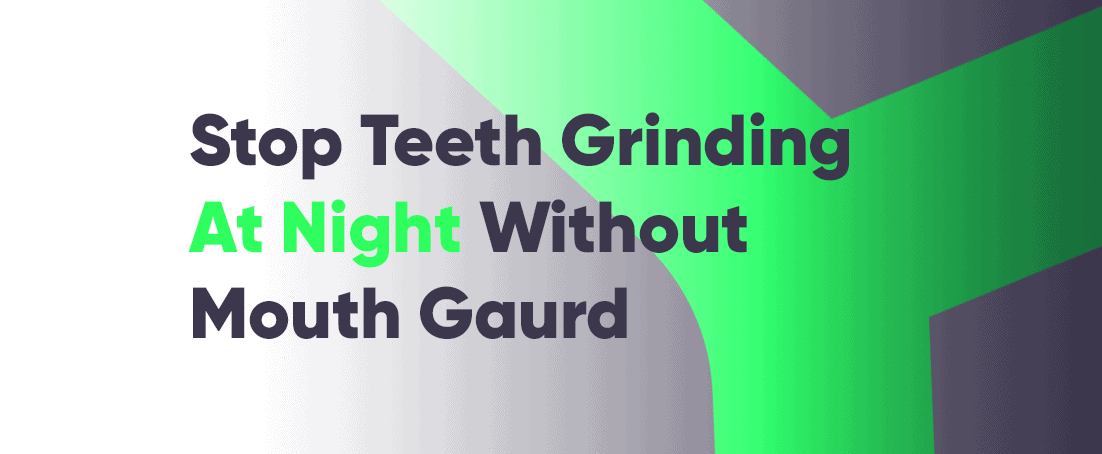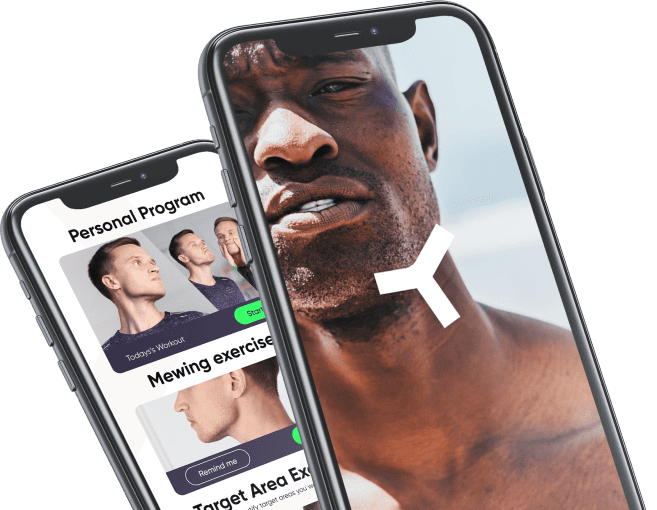
Bruxism is a pervasive issue that affects a significant portion of the population, causing considerable concern among dental professionals and health experts. The grinding or clenching of teeth, particularly during sleep, can lead to a range of dental problems including enamel wear, tooth fractures, and jaw pain.
A dental mouthguard is the gold standard for prevention and relief against teeht grinding. However, acquiring a custom-fit mouthguard isn’t instantaneous. The process involves making dental impressions and can often require a waiting period for manufacturing and shipping. While you await your mouthguard’s arrival, it’s a great idea to try alternative ways to manage bruxism. This article offers you solutions to try before starting to use the night guard.
Symptoms Of Grinding Your Teeth
| Symptom | Frequency of Occurrence | Severity | Treatment Options | Warning Signs |
| Jaw Clenching | Any time of day | Causes discomfort and sometimes pain | Mouth guards, relaxation | Persistent jaw discomfort |
| Headaches | Linked to bruxism | Results in tension-type headaches | Pain relievers, therapy | Jaw and neck tension |
| Earaches | Linked to bruxism | Radiates pain into the ear | Pain relief, jaw exercises | Pain near ear or jaw joint |
| TMJ Disorders | Frequent with bruxism | Leads to jaw pain and mouth issues | Physical therapy, mouth guards | Clicking jaw, difficulty opening mouth |
| Increased Tooth Sensitivity | Chronic bruxism | Causes sensitivity to temperature | Desensitizing toothpaste | Sudden sensitivity to hot/cold |
| Teeth Damage | Chronic bruxism | Leads to fractures and tooth loss | Dental restorations | Visible enamel wear, tooth pain |
| Cheek and Tongue Bites | During grinding/clenching | Results in ulcers and sores | Topical treatments | Frequent cheek or tongue injuries |
Why Mouthguards Are Best to Stop Grinding?
Splint therapy involves the use of dental appliances, often referred to as mouthguards, to treat bruxism. These mouthguards serve as a physical barrier between the upper and lower teeth, minimizing the damage caused by grinding and clenching. Now, let’s delve into why they are often considered the best solution for combating bruxism.
Firstly, affordability plays a significant role in their popularity. Online mouthguards offer an economical alternative to other treatment options, such as surgical procedures or Botox injections. Additionally, these are usually more budget-friendly than custom-made guards from dental clinics, offering a similar level of effectiveness.
Secondly, mouthguards are generally safe to use. The key lies in ensuring a proper fit, as an ill-fitting mouthguard can cause more harm than good. It’s also essential to choose a product free of materials that may cause allergic reactions. Therefore, always scrutinize the composition of the mouthguard before making a purchase.
Lastly, mouthguards offer ease of implementation, particularly against unconscious grinding and nocturnal bruxism. Once fitted properly, they serve as an immediate barrier to protect your teeth and jaw while you sleep. Their simple yet effective design makes them a straightforward, hassle-free solution.
While mouthguards hold their own as an effective treatment for bruxism, it’s beneficial to explore other treatment avenues in conjunction. We will discuss some of these alternative methods in the sections below.
How To Stop Grinding Teeth At Night Without A Mouth Guard?
Cognitive Behavioral Therapy
Cognitive Behavioral Therapy (CBT) is a type of psychotherapy that addresses the underlying stress or anxiety causing bruxism. Sessions with a trained therapist can equip you with stress management tools. While effective, CBT can be expensive and may require a long-term commitment. It is, however, compatible with mouthguard use.
Bedtime Routine
Establishing a calming bedtime routine can also mitigate teeth grinding. A bedtime routine aimed at reducing bruxism could include reading a book, engaging in light stretching, and practicing deep-breathing exercises before sleep to create a relaxed mindset. This method is cost-effective and time-efficient. It also complements the use of mouthguard.
Avoid Stress
Stress is a psychological and physiological response to challenges or threats. It triggers the ‘fight or flight’ mechanism, elevating cortisol levels in the body. Stress is a significant factor in bruxism as it makes the jaw muscles tense, leading to grinding. Effective stress management involves daily practices like exercise, mindfulness meditation, and deep-breathing exercises.
For exercise, aim for at least 30 minutes of moderate exercise most days. Mindfulness meditation involves sitting quietly and focusing on your natural breathing or a word to anchor your thoughts. Deep-breathing exercises require you to sit comfortably, breathe in through your nose, hold for a count of five, and then breathe out through your mouth.
While they these methods are unlikelly to be entirelly effective in preventing teeth grinding, they all have minimal costs, require little time, and are compatible with mouthguard use.
Mouth Exercises
Mouth exercises work by targeting and strengthening specific jaw and facial muscles, which in turn helps in minimizing teeth grinding. For example, you can try a simple jaw opening and closing exercise to work out your jaw muscles. Two popular types are face yoga and mewing.
Face yoga exercises often involve exaggerated facial expressions, such as wide smiles and frowns held for a few seconds.
Mewing is a technique where you press your tongue against the roof of your mouth, aligning the jaw and reducing grinding.
To practice mewing, simply rest your tongue flat against the roof of your mouth, behind your front teeth, and maintain this position as long as possible. This technique is low-cost, risk-free, and requires minimal time investment. It is a key to prevent bruxism for many practitioners.
Biofeedback Treatments
Biofeedback treatments involve devices that monitor your jaw movement and tension, signaling you to stop clenching or grinding. Examples include smart pillows and wrist-worn gadgets that vibrate or beep as a warning. These biofeedback devices are quite effective but can be on the pricier side.
Additionally, they require a conscious commitment to understand and act on the signals. The good news is that biofeedback treatments can work in conjunction with mouthguards, offering a comprehensive approach to managing teeth grinding in the long term.
Medication
Certain medications such as muscle relaxants, Botox, and anti-anxiety medications like Valium can temporarily relieve bruxism. However, these medications come with potential side effects like drowsiness, dependency, and gastrointestinal issues.
Because of these risks, I don’t recommend jumping straight to medication without exploring other options against teeth grinding and consulting your healthcare provider. Medication can be used with mouthguards but must be supervised by a medical professional.
Diet
A balanced diet rich in magnesium and calcium can help alleviate bruxism. The role of magnesium and calcium in mitigating bruxism is quite noteworthy. Magnesium regulates neurotransmitter release and muscle contraction, while calcium aids in nerve function. Together, they help maintain muscle and nerve function, potentially reducing involuntary teeth clenching and teeth grinding.
Incorporating these minerals through a balanced diet rather than vitamin supplements is often more effective. The reason is that foods rich in these minerals often contain other beneficial nutrients that contribute to overall health, which can’t be replicated through isolated supplements.
Proper Sleep Posture
The best sleep posture to reduce teeth grinding is sleeping on your back with your head slightly elevated. This position relaxes your jaw muscles and reduces tension. Proper sleep posture not only minimizes the risk of bruxism but also helps in improving spinal alignment, reducing neck and back pain.
To achieve this posture, consider using orthopedic pillows, ergonomic mattresses, and even sleep positioning devices designed to keep you on your back. These products can be a worthy investment to improve your sleep posture and quality. Most importantly, proper sleep posture complements the usage of mouthguards, making them more effective in reducing teeth grinding.
When Not to Use A Night Guard?
While night guards are an effective measure for many, they aren’t a universal solution for all bruxism cases. There are several scenarios in which using a night guard might not be recommended.
For instance, when dealing with severe misalignment or other dental issues, a night guard might exacerbate the problem rather than solve it. If you are one of such patients, you might wonder how do I know if my night guard fits properly as it always seems to be unfit. It is really important to ensure a proper impression procedure in such cases.
Furthermore, if you have an active infection or open wound in your mouth, using a night guard can risk worsening the condition. In this situation, treating the infection first should be a priority, and methods like mouth exercises or cognitive behavioral therapy can be more suitable for controlling bruxism.
Allergic reactions to the material of the mouth guard are another concern. If you find yourself reacting to the guard, discontinuing its use is crucial. Alternative treatments could involve biofeedback treatments or stress reduction techniques, which are not dependent on materials inserted into your mouth.
Lastly, if you find the mouthguard disrupts your ability to breathe easily during sleep—especially for those with sleep apnea — using a night guard may not be always beneficial. A more comprehensive treatment plan for your apnea including proper sleep posture and possibly CPAP therapy should be considered. However, a godd nitghttime guard may also help with sleep apnea.
Final Words
While mouthguards remain a reliable treatment for bruxism, waiting for one shouldn’t halt your quest for relief. Multiple approaches, from stress management techniques to dietary changes, offer promising alternatives. Always consult your healthcare provider, but don’t overlook the small changes. They will pave the way to better oral health and quality of life.



